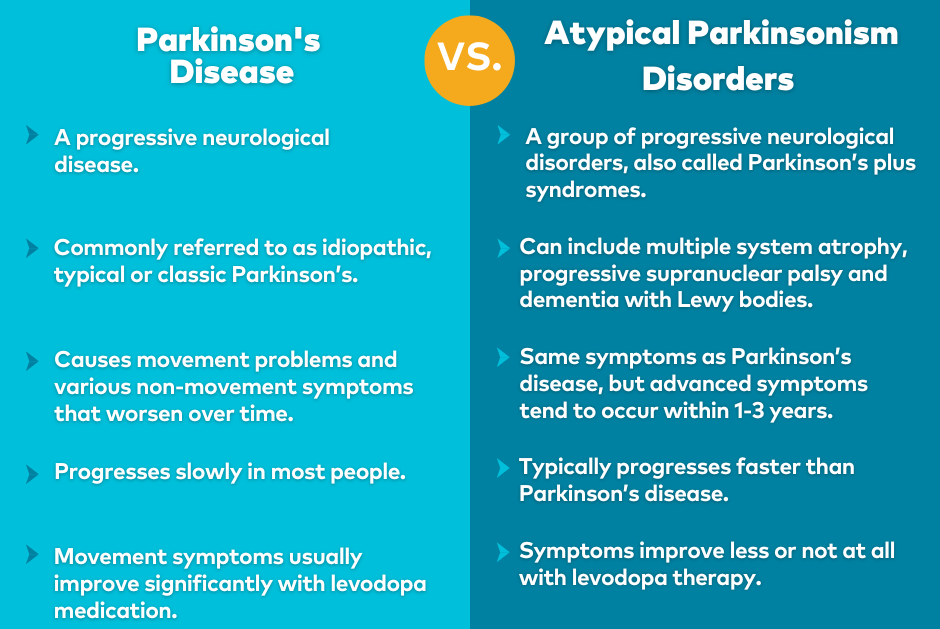Types of Parkinsonisms
💡 Quick Summary
-
Parkinsonism refers to a set of movement symptoms — slowness (bradykinesia), rigidity, and tremor — that can occur in Parkinson’s disease and other conditions.
-
Primary parkinsonism includes PD and atypical disorders, while secondary parkinsonism is caused by medications, toxins or other neurological conditions.
-
Response to the PD medication levodopa helps differentiate Parkinson’s from atypical parkinsonian disorders, but diagnosis requires evaluation over time.

Parkinsonism is a term used to describe the collection of signs and movement symptoms associated with several conditions — including Parkinson’s disease (PD). Signs include slowness (bradykinesia), stiffness (rigidity) and resting tremor. Conditions other than Parkinson's disease may have one or more of these symptoms, mimicking PD. Your neurologist should assess your symptoms when making a diagnosis.
Below are the more common medical conditions that can present with Parkinsonian disorders (parkinsonism). Parkinsonism can be classified into two major groups: primary and secondary.
Primary Parkinsonism
Primary parkinsonian disorders include Parkinson’s disease and atypical parkinsonian disorders. Both can be misdiagnosed, however a neurologist with training in movement disorders can help make an accurate diagnosis and coordinate care.

Secondary Parkinsonism
This type of parkinsonism includes neurological disorders commonly caused by brain tumors, toxins or medications. Symptoms are similar to those seen in Parkinson’s disease and may sometimes go away with treatment, depending on the disorder. Unlike Parkinson’s disease, the medication Levodopa does not improve symptoms.
There are many secondary or acquired causes of parkinsonism.
Atypical Parkinson’s Conditions
Parkinsonian disorders and Levodopa
Various parkinsonian disorders can be categorized based on how they respond to the medication called levodopa. PD tends to respond well to levodopa therapies, while most atypical parkinsonian disorders do not. Sometimes people with parkinsonian symptoms who do not respond well to levodopa may be referred to as having parkinsonism. This can be confusing since parkinsonism technically refers to a set of movement symptoms, rather than a specific diagnosis.
Understanding Your Diagnosis
Despite recent research and diagnostic advances, the diagnosis of PD and types of atypical parkinsonian still relies primarily on a clinical evaluation. There are many overlapping signs and symptoms among PD, atypical parkinsonisms, and secondary parkinsonisms, making it difficult to diagnose. An accurate diagnosis can take months or even years to determine.
You may be diagnosed right away with “typical” or idiopathic Parkinson’s, or your doctor may tell you that you have parkinsonism. A “diagnosis” of parkinsonism may simply mean that you have movement symptoms, like slowness, rigidity and tremor. It might also mean that your doctor does not have enough information to know if your symptoms will respond well to levodopa.
Additionally, some doctors use the term parkinsonism interchangeably with atypical parkinsonism. Talk to your doctor if you have questions about what your diagnosis means.
Page reviewed by Dr. Jun Yu, Movement Disorders Fellow at the University of Florida, a Parkinson’s Foundation Center of Excellence and Jerome Lisk, MD, FAAN, Movement Disorders Specialist at MD Neurology.
Related Materials
Related Blog Posts

10 Tips for Playing Pickleball to Stay Active with Parkinson’s

